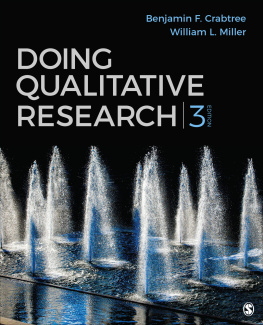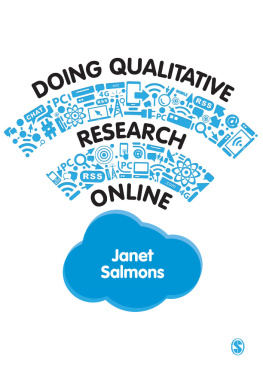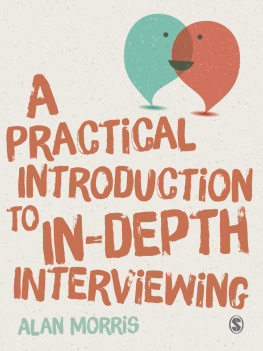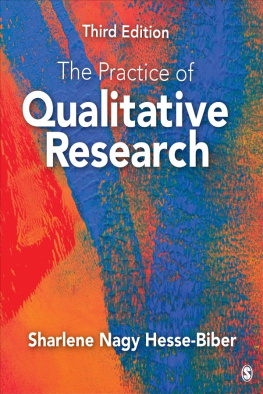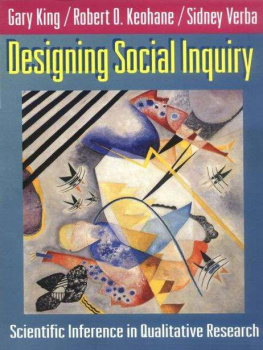Interviews in Qualitative Research
Interviews in Qualitative Research
2nd Edition
- Nigel King
- Christine Horrocks
- Joanna Brooks

- Los Angeles
- London
- New Delhi
- Singapore
- Washington DC
- Melbourne
SAGE Publications Ltd
1 Olivers Yard
55 City Road
London EC1Y 1SP
SAGE Publications Inc.
2455 Teller Road
Thousand Oaks, California 91320
SAGE Publications India Pvt Ltd
B 1/I 1 Mohan Cooperative Industrial Area
Mathura Road
New Delhi 110 044
SAGE Publications Asia-Pacific Pte Ltd
3 Church Street
#10-04 Samsung Hub
Singapore 049483
Nigel King, Christine Horrocks & Joanna Brooks 2019
First edition published 2011
Reprinted 2012, 2014 (twice), 2015, 2016 and 2017 (three times)
This edition first published 2019
Apart from any fair dealing for the purposes of research or private study, or criticism or review, as permitted under the Copyright, Designs and Patents Act, 1988, this publication may be reproduced, stored or transmitted in any form, or by any means, only with the prior permission in writing of the publishers, or in the case of reprographic reproduction, in accordance with the terms of licences issued by the Copyright Licensing Agency. Enquiries concerning reproduction outside those terms should be sent to the publishers.
Library of Congress Control Number: 2018942353
British Library Cataloguing in Publication data
A catalogue record for this book is available from the British Library
ISBN 978-1-4462-7496-5
ISBN 978-1-4462-7497-2 (pbk)
Editor: Jai Seaman
Editorial assistant: Charlotte Bush
Production editor: Katherine Haw
Copyeditor: Richard Leigh
Proofreader: Lynda Watson
Indexer: Charmian Parkin
Marketing manager: Susheel Gokarakonda
Cover design: Shaun Mercier
Typeset by: C&M Digitals (P) Ltd, Chennai, India
Printed in the UK
List of Boxes, Figures and Tables
Boxes
Figures
Tables
About the Authors
Prof Nigel Kingis Professor in Applied Psychology and Dean of the Graduate School, University of Huddersfield. He has a longstanding interest in the use of qualitative methods in applied research, particularly in health and organisational settings. He is well-known for his work on the Template Analysis style of thematic analysis, and is co-author with Joanna Brooks of
Template Analysis for Business and Management Students (Sage, 2017). In recent years he has become interested in visual elicitation methods in qualitative research and has developed with colleagues the graphical technique known as Pictor. His substantive interests include human interaction with nature, experiences of collaborative working in health and social care, patient and carer experiences of chronic and life-limiting illnesses, and innovation and change in organisations. He is the author (with Neil Anderson) of Managing Innovation and Change: A Critical Guide for Organizations (Thomson, 2002).Prof Christine Horrocksis Professor of Applied Social Psychology at Manchester Metropolitan University. She has worked with a range of agencies completing funded research projects investigating a series of policy interventions focussing on understanding health related behaviour and behaviour change. Her research includes collaboration with the probation service investigating coercive treatment interventions for drug and alcohol misuse. She has also worked consistently with the NHS undertaking and supporting the monitoring and evaluation of health interventions. Most recently, she was part of a research team that secured Knowledge Transfer Partnership funding; working collaboratively with Nuffield Health to develop personalised health assessments.Dr Joanna Brooksis a Chartered Psychologist and Lecturer in Health Psychology at the Manchester Centre for Health Psychology, University of Manchester. Her research interests include the long-term management of chronic and palliative illness conditions, and networks of communication and support in health and social care. Her work is informed by a particular interest in the development and use of novel and inclusive approaches to research. Jo has recognised expertise in qualitative research methods and is a committee member of the British Psychological Societys Qualitative Methods in Psychology section (Chair Elect in 2018, Chair 2019-2021). She is editor (with Nigel King) of
Applied Qualitative Research in Psychology (Palgrave, 2017) and author (with Nigel King) of
Template Analysis for Business and Management Students (Sage, 2017).
Preface
Welcome to this second edition of Interviews in Qualitative Research. We have been very gratified by the many positive responses to the first edition. Updating it has been simultaneously fascinating and challenging; we hope the end product proves engaging and useful for readers.
In revising the book we have tried to keep what worked well in the original version, while adding and updating to reflect both developments in the field and in our own thinking. Our aim, as before, was to provide a text that is of practical use to qualitative researchers at any stage of their career who are employing interview methods. We have sought to be readable and accessible without ever trivialising or oversimplifying the sometimes complex issues involved in carrying out qualitative interviews. Whether we have succeeded is for you to judge!
The most important change for this edition has been in authorship; Dr Joanna Brooks from the University of Manchester has joined us as a third author. Jo is a qualitative health psychologist with broad substantive and methodological interests. These include experiences of chronic illness and end-of-life care, the use of participatory methods (especially arts-based), and the development of template analysis and participant-led visual methods. She brings a wealth of experience of applied qualitative research to the subject matter of this book.
We have added two new chapters to the book. focuses on the use of interviews within discursive research. While some in this field strongly favour the collection of naturally occurring language as data, we agree with those who argue for an important continuing role for interviews. We examine how interview methods can be used successfully to support discursive qualitative research.
As well as adding these new chapters, we have revised and updated all the existing chapters, including recent key references and discussing important developments. Inevitably, some chapters have required more extensive changes than others. In we have responded to the considerable advances in technology and related practice since the publication of our first edition. We have also moved the chapter on ethics to an earlier position in the book, to better emphasise how ethical decisions must underpin the whole research process.






